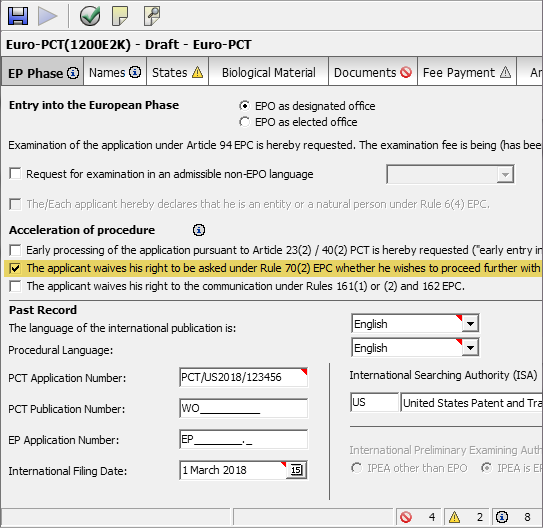5.1 General
5.1.7.Can the applicant request early processing?
5.1.023For this purpose, applicants must file an express request for early processing under Article 23(2) or 40(2) PCT. Section 12.1 of Form 1200 includes a check box for this purpose. However, the request is effective only if they also fulfil the requirements for entry into the European phase as if the 31-month time limit provided for in Rule 159(1) EPC expired on the date they request early processing.
5.1.024This means that, for an application to be processed early, the following requirements must be complied with: payment of the filing fee (see point 5.7.001), including any additional (page) fees (see points 5.7.004 ff), filing of the translation (where applicable; see point 5.5.001), specification of the application documents on which the proceedings before the EPO as designated or elected Office are to be based (see point 5.4.001) and payment of the search fee (where applicable; see point 5.9.016). Which further requirements must be complied with depends on the date on which early processing is requested, i.e. on whether the time limits for paying the designation fee (Rule 39(1) EPC) and the renewal fee (Rule 51(1) EPC) and for filing the request for examination and paying the examination fee (Rule 70(1) EPC) have already expired at that date (see points 5.8.001, 5.11.001 ff and point 5.10.001 ff). The term "necessary requirements" is used to refer to the requirements that must be complied with for a request for early processing of the application concerned to be effective.
5.1.025Where applicable, the certificate of exhibition must also be filed on entry into the European phase (see point 5.12.004). However, if this requirement is not met, this will not prevent the request for early processing from being effective, but it will affect the prior art that the EPO takes into account in the procedure.
5.1.026Claims fees for any claims in excess of fifteen need only be paid before expiry of the period under Rule 162(2) EPC. Therefore, their payment is not a requirement for a request for early processing to be effective.
5.1.027Fees which need to be paid for a request for early processing to be effective may also be paid by automatic debit order. However, applicants should bear in mind that automatic debiting can only be performed if the EPO can establish whether or not a page fee needs to be included as part of the filing fee. This is only possible if the EPO has access to the documents referred to in Article 20 PCT, i.e. if:
–the international application has already been published at the time the request for early processing is received or
–the EPO is the receiving Office or
–the EPO is acting as (S)ISA or IPEA.
If none of the above documents is available to the EPO on the day the request for early processing is filed, applicants should choose another means of payment. Otherwise the fees due will be debited on the date of receipt of the documents referred to in Article 20 PCT from the International Bureau under Rule 47.4 PCT. In this case, the date on which the request for early processing takes effect will be postponed to that date (see point 5.1.028).
5.1.028If on the date the request for early processing is filed all necessary requirements (see point 5.1.024) are complied with, the request for early processing is effective as from that date and the application will be processed in the same way as any "regular" Euro-PCT application which has entered the European phase. This means, for instance, that the EPO as designated/elected Office will issue the communication under Rule 161 EPC/Rule 162 EPC directly after it has established that the request for early processing is effective (see point 5.4.012) and on condition that the international search report has already been established. Furthermore, as from the date the request for early processing is effective, the applicant may file a divisional application (see point 5.18.001).
5.1.029If on the date the request for early processing is filed any necessary requirement (see point 5.2.005) is not complied with, the request for early processing will be effective only from the date on which all necessary requirements have been complied with (see point 5.1.024). It is only on the latter date that the application enters the European phase. From that moment on it is processed as if the 31-month time limit had already expired, i.e. in the same way as any "regular" Euro-PCT application which has entered the European phase.
5.1.030If the requirements for a request for early processing to be effective are not complied with before expiry of the 31-month time limit, the EPO as designated/elected Office cannot start processing the application until that time limit has expired.
5.1.031From the date the applicant's request for early processing is effective, any subsequent withdrawal under Rule 90bis PCT will have no effect in respect of the procedure in the European phase.
5.1.032Where applicants request early processing with a view to starting not only the application's processing before the EPO as designated/elected Office but also its examination, they must have filed a valid request for examination (including payment of the examination fee) under Article 94 EPC, even if the time limit under Rule 70(1) EPC has not yet expired at the date of effective entry into the European phase, since examination will be taken up only if a request for examination has been validly filed.
5.1.033Furthermore, where applicants have filed a request for examination before the EPO has sent them the supplementary European search report (where applicable), the EPO will not start examination until it has received from them an indication that they wish to proceed further with their application and, if required, their response to the extended European search report. Applicants may waive the right to be asked whether they wish to proceed further by selecting the second check box in Section 12.2 of Form 1200.
